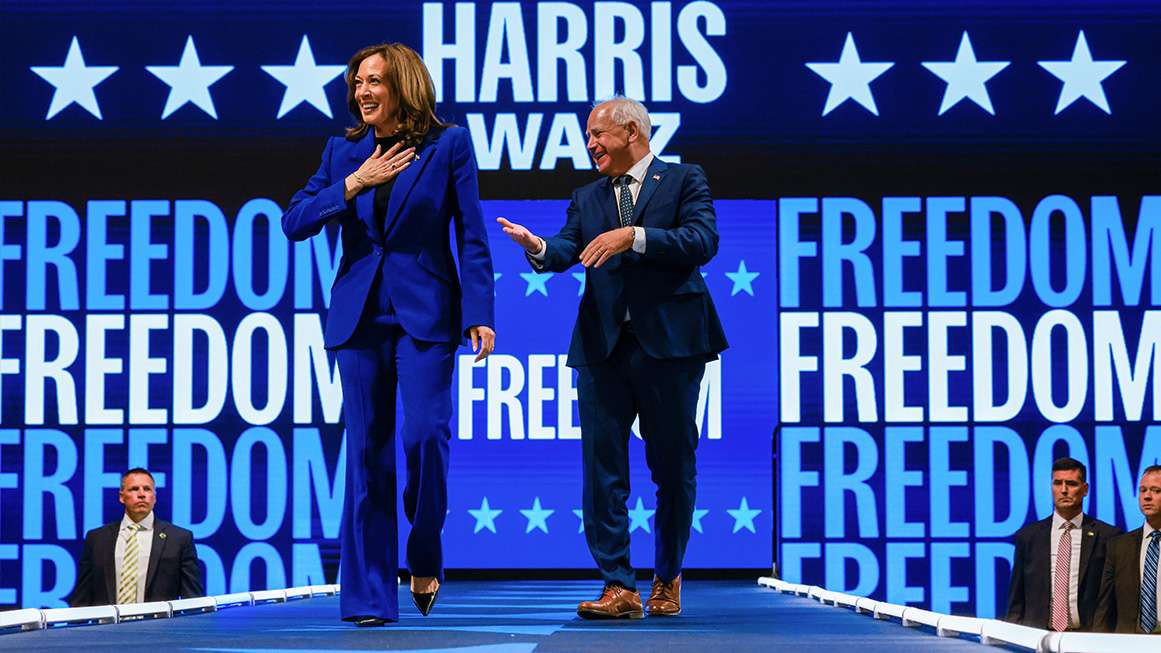Kamala Harris has been criticized for her lack of consistency throughout her political career. She has been accused of flip-flopping on issues and lacking a stable ideological core. However, in recent years, Harris has been evolving towards more moderate and mainstream positions, moving away from her previous ultraprogressive platform.
Her campaign has embraced the theme of “freedom” for the 2024 election, with the word prominently featured at rallies and events. While Harris has faced criticism for her past positions on issues like health care and criminal justice, she has been shifting towards more moderate stances, distancing herself from her previous more authoritarian views.
Evolution Towards Freedom
Despite her past support for progressive policies like the Green New Deal and Medicare for All, Harris has been changing her positions on various issues. She now supports marijuana legalization, fracking, and has distanced herself from proposals like mandatory gun buybacks and federal job guarantees.
Her recent shifts towards more moderate positions have been seen as a move towards freedom and away from authoritarianism. While it remains to be seen if these changes are permanent, Harris’s evolving stance on issues reflects a new era in her political career.
A Prosecutor with a Law-and-Order Stance
In the past, Harris has been criticized for her actions as a prosecutor, where she often talked about progressive values but acted in ways that contradicted those values. Her support for tough measures on guns and alleged sex crimes has raised concerns about her commitment to criminal justice reform.
Despite her past inconsistencies, Harris’s recent shifts towards more moderate positions and away from her previous authoritarian views suggest a new direction for her political career. As she defines herself for the 2024 campaign, Harris is presenting a different image than in her previous roles.
She has worked to put away rapists, domestic abusers, and other violent offenders, but she has not focused on cracking down on misdemeanor offenses or threatening to jail the parents of truant children. Additionally, she has shifted her stance on decriminalizing border crossings, now aligning with the Biden administration’s position that unauthorized border crossings are illegal. Despite this change, Harris is now positioning herself as the pro-freedom candidate in the 2024 election, emphasizing the words “freedom” and “future” in her messaging and campaign imagery.
During her campaign events, Harris has stressed the importance of personal freedom, criticizing government intervention in personal decisions. Her emphasis on freedom has been a central theme in her campaign, with the word repeated in big block letters at rallies and in DNC messaging. This focus on freedom is a strategic move to challenge Republican claims to liberty and position Democrats as the true champions of American values.
However, the paradox of Democrats’ freedom rhetoric lies in their definition of freedom. While some of it focuses on negative liberty, the freedom from coercion by others or the state, much of it centers on positive liberties, such as the right to access certain goods or services. For Harris, freedom includes the freedom to advance in life, be safe from gun violence, and make decisions about one’s own body.
Ultimately, Harris’ campaign is presenting a vision of freedom that contrasts with the Republican Party’s policies, framing Democrats as defenders of fundamental freedoms against intrusive government intervention. It represents a variety of gun control policies endorsed by Harris, such as a ban on selling semiautomatic rifles, regulation of 3D-printed guns, and stricter rules on gun purchases. The idea of “freedom from gun violence” reinterprets the individual right protected by the Second Amendment, using the concept of “freedom” to justify a range of regulations.
Harris has emphasized that “the right to be safe is a civil right,” but the government cannot ensure everyone’s safety just as it cannot guarantee happiness or other personal aspects of life. While basic rules can be implemented to protect life and property, any further attempts to guarantee safety could lead to policies that invade privacy and restrict freedom. Framing safety as a government responsibility opens the door to limitless government intervention.
Similarly, Harris has promoted the idea of the “right not just to get by, but get ahead,” which suggests a focus on positive rights rather than freedom from coercion. Positive liberty can often infringe on other liberties, as seen in policies that shift costs onto others to provide certain benefits. This type of freedom also comes with a significant financial cost, as evidenced by estimates that Harris’s agenda could increase the U.S. deficit by $1.7 trillion over a decade.
The distinction between positive and negative liberty, explored by Isaiah Berlin, highlights the irreconcilable attitudes towards freedom. Harris’s approach to freedom leans towards positive liberty, emphasizing government intervention to provide certain rights rather than protecting individuals from excessive government interference.
One concerning aspect of Harris’s policies is the potential for federal price controls on groceries, which could lead to shortages and higher prices in the long run. This plan reflects a broader trend of blaming economic issues on wealthy individuals and corporations, rather than addressing systemic problems. While this messaging may resonate with populism, it may not be a sound economic strategy.
Overall, the Harris-Walz agenda focuses on addressing rising costs by targeting businesses for anticompetitive practices, echoing similar themes seen in the Biden administration. The emphasis on going after companies that engage in illegal behavior may overlook the broader economic complexities at play. Harris and Walz have committed to introducing new legislation aimed at expanding the scope of illegal behavior, such as preventing corporate landlords from using data to collude and raise rents, as well as banning price gouging on food. Their goal is to stop unethical practices and ultimately lower prices.
However, the notion of evil corporate entities manipulating prices is largely exaggerated. Grocery prices have increased due to factors like supply chain disruptions, higher wages, and government spending during the pandemic. Prices have started to decrease not because corporations are less greedy, but because pandemic-related issues are subsiding. Rising rents are a result of a lack of housing supply.
While there may be some bad actors to address, the belief that enforcing antitrust laws will universally reduce prices is misleading. This populist approach promises significant changes but often falls short in reality, offering only superficial adjustments.
Increased government intervention in the market could potentially drive prices higher by raising business costs, stifling innovation, and interfering with market signals. This contradicts the concept of economic freedom, which is essential for overall freedom.
Harris’ political stance seems to fluctuate between progressive and moderate Democratic ideas, reflecting the party’s current direction. She supports select socialist policies while considering government control over grocery prices and gun ownership. The campaign aims to redefine freedom by blending government intervention with personal liberties.
While the focus on freedom may seem positive, the Harris-Walz rhetoric risks distorting the meaning of freedom by associating it with increased government involvement. This could confuse concepts like liberty and ultimately harm the understanding of these fundamental principles.
In conclusion, the Harris-Walz campaign’s approach to freedom and government intervention presents a complex challenge that could impact long-term perceptions of individual liberties and government control. Please rewrite this sentence.
Source link






